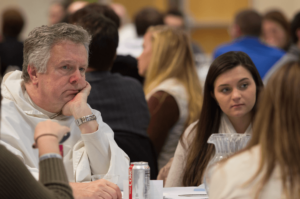by The Cowl Editor on April 12, 2018
Campus
by Darren Squillace ’19
News Staff

Students at Providence College, whether freshmen or seniors, were all once faced with the difficult and imposing decision during high school of choosing a school at which the would spend their next four years. Many students, while excited to have made the decision to become future Friars, were still nervous about if they had made the right decision or not, how they would adapt to living in a totally new and different college atmosphere, and how they would integrate ourselves into the PC community. The theme at the Teach-In that was held on Monday is that here at PC, students are more than just parts of a larger community, they are truly part of one big “Friar Family.”
The teach-in was the second of such events PC has hosted this year, as the one held prior to Monday had been highly productive. The event is part of a broader initiative set forth by Rev. Dr. Bernice A. King at the College’s convocation for her father, Dr. Martin Luther King Jr., which called for a “beloved community.” In what turned out to be a larger crowd than the previous event, the teach-in hosted a variety of not only student’s, but faculty and administration as well. Students sat with a mix of both student and administrators.
The goal of this event was to address possible shortcomings that our PC community has faced in trying to foster both a diverse and inclusive community. There were a variety of different issues brought up by each table. One of the most notable issues was the fact that many felt that as students entering the College as freshmen perhaps there could have been more programs or activities to help get students engaged with this message of inclusion. There were countless examples, including Moore Hall which had been discussed at length at one table, where there has potentially been a lapse in communication between students and as to what these resources signify within the PC community.
The lack of understanding that these programs and resources are actually meant to foster more inclusion among members of our community was surprising to the administrators that students interacted with. While there was obviously significant progress made towards reaching the goal of a beloved community set by Bernice King, it was also evident that there is still much work to be done by all members and groups on campus to reach a complete state of unity.